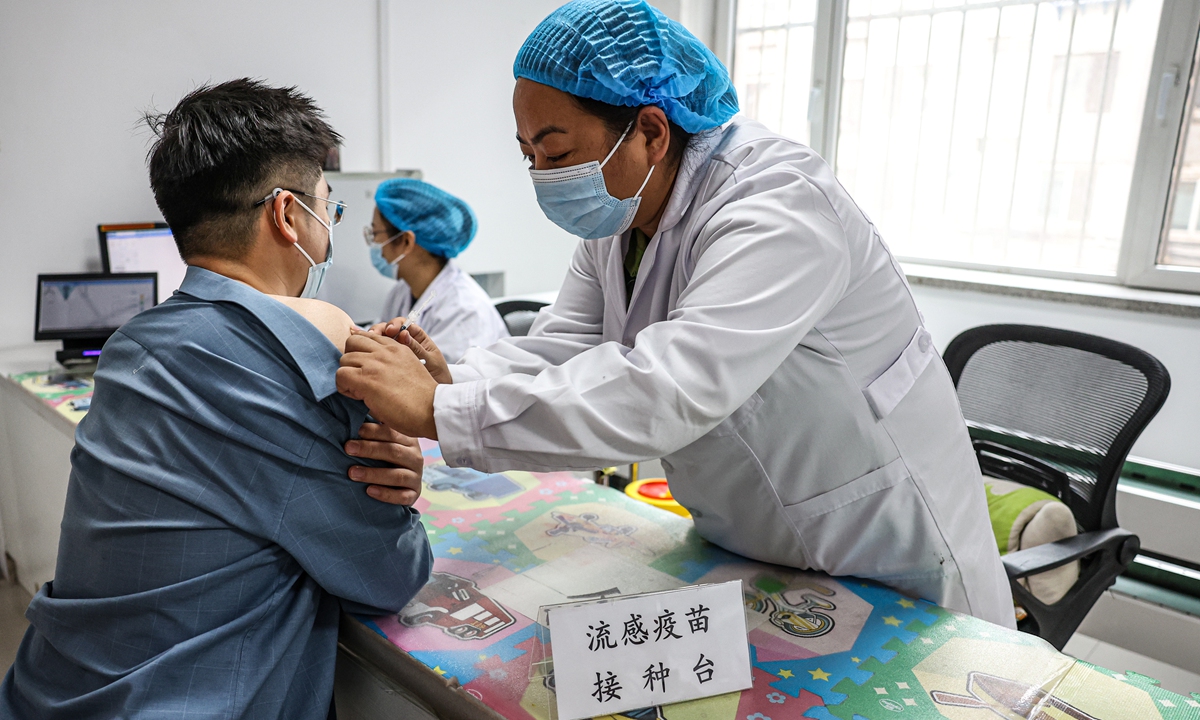China's newly drafted medical emergency regulations stipulate 2-hour reporting system for major incidents

A resident receives a flu vaccine at a community health service center in Shenyang, Northeast China's Liaoning Province, on November 15, 2023. Respiratory diseases have progressed to their peak period of incidence across China, posing a threat to vulnerable groups such as children and the elderly. Photo: VCG
For major public health emergencies that result in more than five deaths or critical cases, provincial health authorities must report to China's top health authority within two hours upon receiving the report, according to new medical emergency regulations released by the National Health Commission (NHC) on Monday.
The NHC released the trial regulation to clarify the mechanisms and processes for emergency medical responses to sudden incidents, and to standardize and efficiently carry out emergency medical rescues in order to avoid and reduce casualties and ensure people's safety and health.
When the casualty situation is not clear, the situation should be reported first, with specific casualties submitted later. Health administrative authorities below the provincial level can directly report to the NHC, while copying the higher-level health authorities. The NHC should promptly report to the State Council upon receiving the report, according to the regulation.
The drafting of the trial regulation was based on relevant emergency, medical laws, regulations and contingency plans, including the Emergency Response Law of the People's Republic of China, Basic Healthcare and Health Promotion Law and the national emergency response plan for public health emergencies, said the NHC.
The trial medical emergency regulation was released in a timely manner, providing clear guidance and assistance to medical institutions in dealing with sudden health emergencies, Lu Hongzhou, head of the Third People's Hospital of Shenzhen, told the Global Times on Tuesday.
For example, based on the Law on Prevention and Treatment of Infectious Diseases and other relevant laws and regulations, infectious disease patients should be promptly transferred to designated medical institutions for treatment, Lu said.
The trial regulation standardizes the system of medical emergency information discovery and reporting, as well as the entire process of medical emergency disposal. It clarifies the work responsibilities of relevant departments and institutions.
The health authorities will establish a system for retroactive investigation and accountability in order to strengthen inspection and guidance and improve the timeliness and accuracy of reporting. For those units that report late, omit, lie, or conceal information, they shall be resolutely held accountable in line with relevant regulations.
It also clarifies the standards for on-site medical emergency disposal, injury classification, treatment of the injured and other facets. It stipulates the management of medical emergency teams and base construction, the establishment of a medical emergency expert database, the formulation of medical emergency plans, the reserve of medical supplies, training and drills and other areas as well.